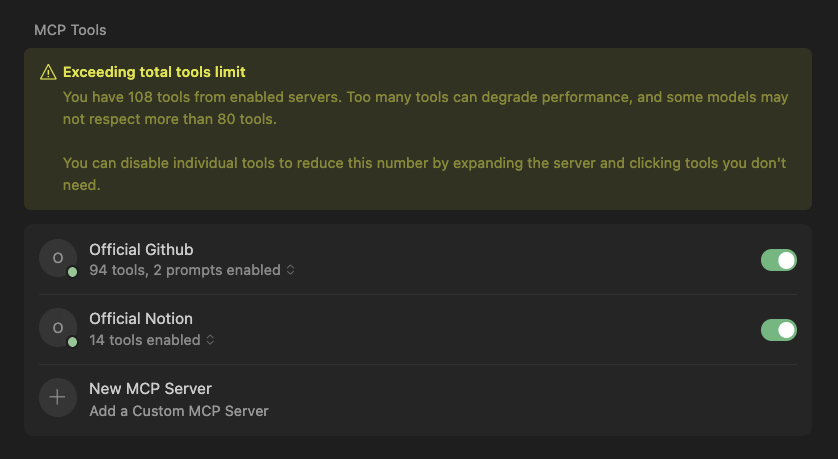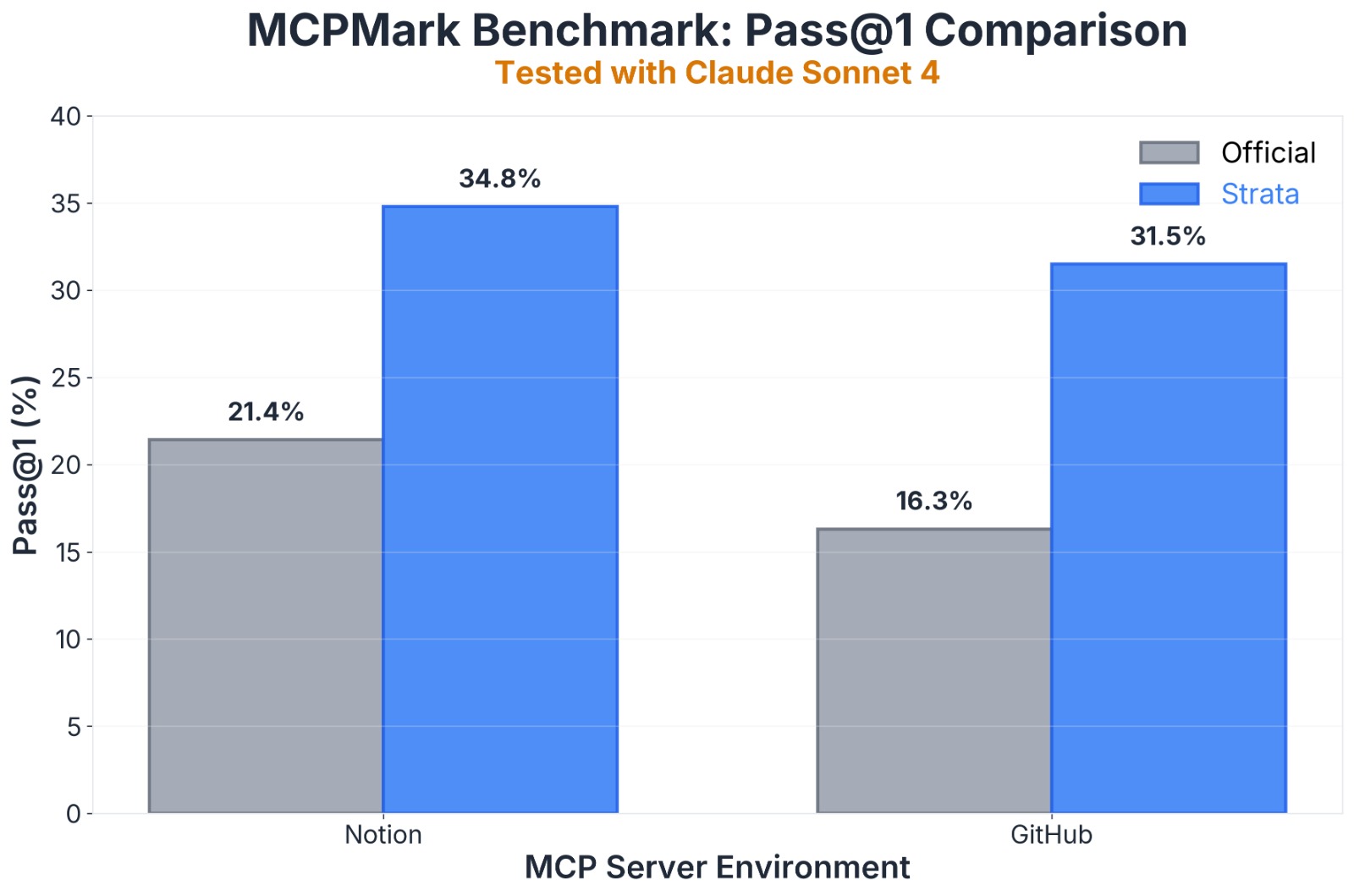We are introducing Strata, one MCP server that guides your AI agents through thousands of tools in multiple apps progressively. It eliminates context overload and ensures accurate tool selection, enabling agents to handle complex, multi-app workflows with ease.
The Problem
AI agents have evolved from simple chatbots into sophisticated systems capable of interacting with hundreds of external tools. Some real world examples:
- Sales agent: Compile today's calendar, pull recent email threads, and enrich attendees via LinkedIn/CRM for a pre-meeting brief.
- Marketing agent: Fetch today's top Product Hunt launches, find contacts (e.g., Clearbit/Hunter), and write them to a Google Sheet.
- AI voice agent: From a call transcript, schedule a follow-up with Kevin on Calendar and send a recap email with action items.
- Coding agent: Pull Supabase database schema, fix migration issues, and send a PR with the changes.
However, this progress has revealed a critical bottleneck: Tool Overload. When agents are given access to dozens or hundreds of tools simultaneously, their performance collapses. The problem isn't with the AI models themselves, it's with how we architect tool access. 
* Cursor and other coding agents limit tools to prevent performance degradation.
Context Overload: Every tool an agent can access must be described in its prompt, including the tool's name, purpose, and parameters. With dozens of tools, these descriptions can consume a significant portion of the model's context window, leaving less room for actual conversation and increasing API costs dramatically.
Decision Paralysis: Even when the context fits, LLMs faced with massive tool lists struggle to differentiate between similarly named or described options. This leads to incorrect tool selection, confusion between similar APIs, and degraded performance on complex workflows.
Limited Coverage: To avoid these problems, most MCP servers artificially cap themselves at 40-50 tools, severely limiting what developers can build and forcing agents to work with incomplete toolsets.
Industry research confirms these limitations. LangChain's experiments with ReAct agents showed that performance degrades significantly once agents are given access to multiple tools, with the effect becoming pronounced at scale. Meanwhile, benchmarks like MCPMark reveal that even state-of-the-art models struggle with tool selection when faced with comprehensive toolsets.
How Strata works
Strata solves tool overload by fundamentally changing how AI agents discover and access tools. Instead of overwhelming the agent with everything upfront, Strata guides agents through a logical, progressive discovery process: much like how a human would approach an unfamiliar system.
* Short demo of Strata introduction.
Intelligent pre-loading of user integrations
Strata intelligently pre-loads the integrations that you or your users have already enabled. This capability ensures that agents don't waste time exploring unavailable tools and gives you precise control over which tools are accessible to the agent—eliminating frustrating responses like "Sorry, would you like me to search in Gmail or Outlook?"
Progressive discovery architecture
When an agent needs to accomplish a complex task, Strata works through four intelligent stages, driven by four specialized tools:

* Overview of Strata's progressive discovery tools.
- discover_server_categories: First, based on user intent the model/AI agent will reasoning which service within user pre-loaded integrations (e.g., GitHub, Jira, Notion). and Strata send the categories for those services (e.g., Repos, Issues, PRs for GitHub, Projects for Jira, Pages for Notion).
- get_category_actions: The AI agent identifies the relevant categories. Strata responds with available actions (tool names and descriptions only) for those categories.
- get_action_details: The AI agent selects the specific action to execute. Strata provides the complete schema only at this point.
- execute_action: Strata performs the actual operation with the correct parameters.
Strata leverages the model's natural reasoning abilities to navigate the toolset systematically. This approach mirrors human problem-solving behavior and dramatically reduces cognitive load on the AI model.
We optimize the first tool as discover_server_categories_or_actions, which intelligently determines whether to skip the category step for simple integrations or even bypass the action step entirely for very basic toolsets. This optimization significantly reduces tool call overhead and improves runtime performance.
Additional Support Tools
Strata includes supplementary tools to enhance agent capabilities:
- search_documentation: When agents need additional context or failed at the progressive discovery, Strata searches integration documentation to provide relevant information on demand. We use the BM25 algorithm with pre-cached indices for minimal latency.
- handle_auth_failure: When authentication issues occur, Strata automatically detects the integration's authentication method (OAuth or API key). For OAuth flows, it provides white-labeled authentication links with your organization's branding and logo. For API key authentication, it guides users through the appropriate setup process.

* Strata UI.
Compatibility
Strata seamlessly integrates with any external MCP server: whether it's your custom implementation, official MCP servers, or community-built solutions. Simply connect any MCP server to Strata, and it automatically transforms into a discovery-driven architecture without requiring any additional configuration on your part. This interoperability ensures you can leverage existing MCP ecosystem tools while benefiting from Strata's intelligent discovery capabilities.
Evaluation
Strata demonstrates significant gains in both standardized benchmarks and practical evaluations. Strata enables agents to reliably carry out multi-step requests, coordinate across different tools, and adapt to changes in context throughout complex workflows.

* Benchmark results from MCPMark.
- MCPMark (pass@1): +15.2% vs the official GitHub server; +13.4% vs the official Notion server
- Human evaluations (complex, multi-app workflows): 83%+ task accuracy
How to use Strata
Strata is available through three convenient options and is completely FREE to use:
One Click UI: In the Klavis dashboard, connect Strata to any your favorite MCP-powered client (Claude, Cursor, VS Code, ChatGPT) with just one click.
API/SDK: Create Strata MCP Server for your or your users with the apps they like.
curl --request POST \
--url https://api.klavis.ai/mcp-server/strata/create \
--header 'Authorization: Bearer <KLAVIS_API_KEY>' \
--header 'Content-Type: application/json' \
--data '{
"userId": "<user_id>",
"servers": ["GitHub", "Slack", "Salesforce"]
}'
- Open source & self-host on your own data
Check our documentation for more details.
Ready to Get Started?
Ready to build powerful, multi-app AI agents with Strata? 👉 Sign up for free!
Want to chat? Email us: founders@klavis.ai or ☎️ Book a call.
